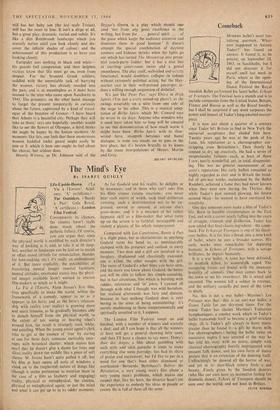The Mind's Eye
By ISABEL QUIGLY
Life-Upside-Down. ('La Vie a l'Envers'; Acad- emy, 'A' certificate.)— The Outsiders. (`Bande Part'; Gala Royal, 'A' certificate.)----London Film Festival.
flit °4 . 1 , CONSIDERING As chances,
the cinema hasn't really done much about the pathetic fallacy. Of course, you can argue that, since the physical world is modified by each director's way of looking at it, and, to take it at its simp- lest, weather or landscape can be laid on to match or offset mood (drizzle for renunciation, thunder for love-making, etc.), it's really an embodiment of it. But more explicitly, the possibilities of translating mental images (mental furniture, mental attitudes, emotional states) into the physi- cal images available hasn't seemed to interest film-makers as much as it might.
La Vie a l'Envers, Alain Jessua's first film, tries specifically to make the world, within the framework of a comedy, appear to us as it appears to his hero; and as the hero's relation- ship with reality (our reality) is growing more and more tenuous, as he gradually becomes able to detach himself from the physical world, to the extent of not seeing or hearing what's around him, the result is "strangely cool, white, and puzzling. When the young estate agent's clerk tries to get at the essence of 'tree' by staring at one for three days, someone inevitably inter- rupts with botanical chatter; which makes him snarl that he doesn't give a damn for trees and slices reality down the-middle like a piece of soft cheese. M. Jessua hasn't quite pulled it off, but his film at least opens all sorts of windows a chink on to the (neglected) nature of things like (though it seems portentous to mention them in the case of a film as feathery and engaging) reality, physical or metaphysical, the cinema, Physical or metaphysical again; or just the mind and what it can get up to in its odder moments. As for Godard and his reality, he delights or he nauseates; and in those who can't take him his films arouse vicious reactions; you never hear such snorts of wrath, such loud deliberate yawning, such a determination not to be im- pressed, moved or amused, at anyone else's press-shows; and it is a measure of his rather hypnotic skill as a film-maker that what turns up on the screen is so faithful, inescapable and violent a picture of his whole temperament.
Compared with Les Carabiniers, Bande a Part is a slight piece, but as characteristic as anything Godard turns his hand to, as unmistakably stamped with his presence and outlook in every moment. Two men and a girl are involved in a burglary, ill-planned and chaotically executed; one is killed, the other escapes with the girl. The more of Godard's other films you have seen, and the more you know about Godard, the better you will be able to follow this simple-sounding, but in fact circuitous, film which is bursting with riddles, references and 'in' jokes. I yawned all through with whaf I thought was wild boredom, but realised afterwards was fury and distaste, because in fact nothing Godard does is ever boring in the sense of being uninteresting: it's merely maddening to those temperamentally and spiritually unsuited to it, I suppose.
The London Film Festival swept on and finished, with a number of winners and scarcely a dud; and all 1 can hope is that all the winners at least will get a general showing here soon, and then I'll have a chance to say more. Demy's Bale des Anges, a film about gambling with such style and such panache it tends to make everything else seem porridgy, has had its share of praise and excitement; but I'd like to put in a word for one that's been either dismissed or overlooked—Bernardo Bertolucci's Before the Revolution, a very young man's film about a very young man's problems, which makes one suspect that, like his hero, the director hasn't yet the experience to embody his ideas in people or events. He is full of them all the same.










































 Previous page
Previous page